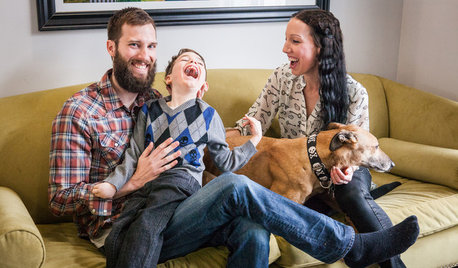Healthcare.gov - It worked . . . finally.
kellyeng
10 years ago
Related Stories

CONTRACTOR TIPS10 Things to Discuss With Your Contractor Before Work Starts
Have a meeting a week before hammers and shovels fly to make sure everyone’s on the same page
Full Story
HOME OFFICESWorking at Home Together (and Apart)
One is easy. Two, not so much. Here are ways to make room for two to work at home
Full Story
LIFE8 Ways to Make an Extra-Full Nest Work Happily
If multiple generations or extended family shares your home, these strategies can help you keep the peace
Full Story
HOUZZ TOURSMy Houzz: Vision Pays Off in a Vibrant Live-Work Space
A plain box becomes a creative, eclectic home at the hands of hardworking homeowners and their remodeling team
Full Story
BUDGETING YOUR PROJECTConstruction Contracts: What to Know About Estimates vs. Bids
Understanding how contractors bill for services can help you keep costs down and your project on track
Full Story
CONTRACTOR TIPSBuilding Permits: The Inspection Process
In Part 5 of our series on home building permits, we explore typical inspection schedules for a variety of project types
Full Story
CONTRACTOR TIPSBuilding Permits: What to Know About Green Building and Energy Codes
In Part 4 of our series examining the residential permit process, we review typical green building and energy code requirements
Full Story
MOST POPULARWhat to Do After a Hurricane or Flood
How you treat your home after a natural disaster can make all the difference in its future livability — and your own personal safety
Full Story
UNIVERSAL DESIGNMy Houzz: Universal Design Helps an 8-Year-Old Feel at Home
An innovative sensory room, wide doors and hallways, and other thoughtful design moves make this Canadian home work for the whole family
Full Story
LIFEWhy We Want a House With a Great View
Research shows that just looking at nature has powerful mental benefits. Here's how to get a boost — with or without a million-dollar view
Full Story






mdrive
gsciencechick
Related Professionals
Bloomingdale Interior Designers & Decorators · Chaska Furniture & Accessories · Detroit Furniture & Accessories · North Hollywood Furniture & Accessories · Richfield Furniture & Accessories · Sudbury Furniture & Accessories · Tamalpais-Homestead Valley Furniture & Accessories · Carpinteria Furniture & Accessories · Jacinto City Furniture & Accessories · Greenville Lighting · Berkeley Window Treatments · Brenham Window Treatments · Kent Window Treatments · West Des Moines Window Treatments · Westfield Window Treatmentsgolddust
beaglesdoitbetter1
beaglesdoitbetter1
golddust
beaglesdoitbetter1
awm03
funnygirl
beaglesdoitbetter1
awm03
springroz
beaglesdoitbetter1
golddust
Annie Deighnaugh
roarah
User
User
roarah
neetsiepie
golddust
3katz4me
awm03
beaglesdoitbetter1
golddust
acdesignsky
beaglesdoitbetter1
golddust
beaglesdoitbetter1
roarah
neetsiepie
neetsiepie
golddust
golddust
gsciencechick
golddust
terezosa / terriks
golddust
beaglesdoitbetter1
gsciencechick
beaglesdoitbetter1
golddust
tishtoshnm Zone 6/NM
patty_cakes
Diane Smith at Walter E. Smithe Furniture
joaniepoanie
3katz4me
romy718
awm03
springroz